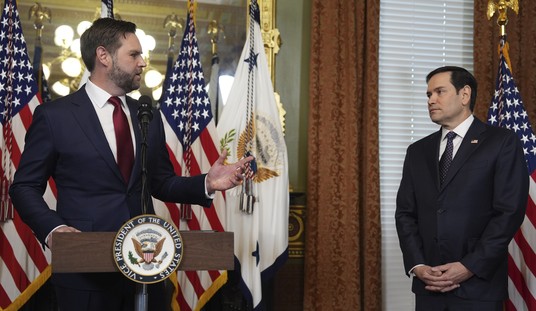Surprise! Despite the clamor on the Left to “reform” the filibuster now that Democrats have lost most of their Senate majority, some Democrats have looked ahead to the next election and balked at making the majority omnipotent. A flurry of proposals to change the rules to end or neuter the filibuster have clogged the process, with none of them gaining a consensus. “Reform” backers have become so desperate that they want to change the definition of a day in order to get more votes:
The debate rests around a series of proposals put forward by several Democrats, including one by Sen. Tom Udall (D-N.M.), who says that the Constitution gives the Senate ability to set its rules – and that on the first legislative day, such changes can be made by a simple majority of 51 senators. Since rule changes typically require support from two-thirds of the Senate, Majority Leader Harry Reid (D-Nev.) is facing new pressure to simply extend the first legislative day by recessing the chamber at the close of business – rather than adjourning. That move could extend that first legislative “day” for several weeks and could give Democrats more time to build support for their proposal. …
Sixty-seven votes would be needed to change Senate rules, a highly unlikely scenario in a polarized chamber where Democrats hold a 53-47 majority. But the Constitution allows each house of Congress to set its own rules, and on the first day of the new Senate, a simple majority of 51 senators may be allowed to vote to change Senate rules after parliamentary rulings are made by the presiding officer, Vice President Joe Biden.
Udall, the New Mexico Democrat, has long planned to push on the first day of the new Congress what he calls the “constitutional option” – to allow future rule changes to be made by a simple majority vote. That would allow for subsequent changes to the filibuster rule to be made if Democrats limit their defections to just two members.
Why, that’s exactly what voters had in mind during this past midterm election! They turned out in droves to vote for even more chicanery and posterior-protecting absurdities, like insisting that a day can last for weeks. That has an additional, practical complication; it would appear to require Joe Biden to continuously preside over the Senate, as the Vice President does on the first day in a session. It’s not as if Biden is especially busy, of course — Wreckovery Summer is long over — but even Senators can only take so much of Sheriff Joe.
Republicans have wasted no time in casting this as a power grab. The Senate Republican Policy Committee has already begun circulating their argument for defending the filibuster as is. It attacks Harry Reid for trying to stop the minority from having influence in the upper chamber, and for being the root cause of the problem:
The Senate is a unique legislative institution, designed to guarantee that the minority party – and the large block of Americans they represent – has a voice. The Senate‟s rules are written to require minority participation, which tends to result in legislation with bipartisan and broad public support.2 Two distinctive features of Senate procedure are the right to debate and amend. The Democrat majority has made a habit of squelching both of these features, preferring to use procedural gambits to force a partisan agenda through the chamber.
The Majority Leader has used his powers to block Republican input on legislation. The Majority Leader is always the first to be recognized on the Senate floor, and he can use that power to offer a series of Democrat amendments to pending legislation in a manner that prevents Republicans from offering any of their ideas. This is called “filling the tree.” According to the Congressional Research Service (CRS), Majority Leader Reid has employed this tactic a record 44 times.3 He has used it to block minority input into legislation three times more often than the previous Majority Leader, and more than the past six Majority Leaders combined.4
The Majority Leader has made a habit of shutting down debate before it even starts. In the Senate, the majority can force an end to debate on any matter by a procedure known as cloture. Majority Leader Reid has indicated his lack of interest in deliberation by moving to shut down debate the very day measures are first considered on the Senate floor. According to CRS, the majority has done this nearly three times more, on average, than the previous six majorities.5 In fact, the current majority in its two Congresses in power has moved to end debate on measures a total of 29 times prior to any amendments even being voted on.6 The previous majority did this less than half as often—only 12 times in the preceding two Congresses.7
The Majority Leader also has limited discussion of his agenda by short-circuiting the committee process. In the Senate, legislation generally is referred first to a committee of Senators with specialized experience in the matter at hand. The committee process typically involves hearings and legislative “markups” where a small group of Senators can discuss proposed legislation in detail and consider a wide range of amendments. This process can allow for significant minority party participation. However, the current majority has completely eliminated the committee process for important matters.8 According to CRS, this majority has set a record for bypassing the committee process, doing so 43 times total.9 In fact, according to CRS, it has done this almost 50 percent more than the last majority and, on average, twice as much as was done in the prior seven Congresses (1993 to 2006).10
The letter concludes:
The Senate, and the rules under which it operates, performs a unique and beneficial function in our legislative system. Democrats, fresh from an electoral “shellacking,”14 should respect both the Senate‟s role in the system and the will of the voters by working with Republicans in the 112th Congress on commonsense, consensus measures that most American support. Unilaterally changing the rules of the Senate by a bare majority would be unprecedented – no Senate Majority Leader has ever done such a thing. Moreover, it would forever change the nature of the Senate and constitute a naked partisan power grab. Such a move would disrespect our bipartisan system and the will of the American people.
Interestingly, Republicans offer no defense for secret holds in their argument. They aren’t even mentioned. If Reid wants to conduct a reform that would generate bipartisan support and a lasting improvement to the upper chamber, he should propose the elimination of the secret hold, a process that takes place in the dark, rather than attack the filibuster, which takes place in the open. That, at least, would demonstrate that Reid and his caucus paid some attention to the message sent by voters in the midterms.








Join the conversation as a VIP Member